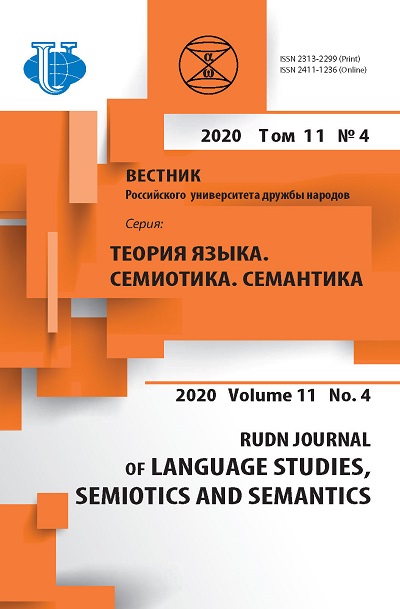Means of Implicitness in Russian Political Weblogs
- Authors: Vidineeva N.Y.1
-
Affiliations:
- Penza State University
- Issue: Vol 11, No 4 (2020)
- Pages: 733-744
- Section: Functional grammar. Functional Semantics
- URL: https://journals.rudn.ru/semiotics-semantics/article/view/25048
- DOI: https://doi.org/10.22363/2313-2299-2020-11-4-733-744
- ID: 25048
Cite item
Full Text
Abstract
The study concerns genre characteristics of weblogs as well as the analysis of linguistic means of implicitness in political weblogs. The ongoing communication media development challenges researches with the investigation of its features. From the linguistic standpoint, the genre approach to media studies seems to be the most relevant. We assume that pragmatic genre studies meet the needs of weblogs investigation in the best possible way. This is due to taking into consideration the genre interlocutory nature and the factors of the speaker and the recipient. A weblog is a hybrid genre originating from personal diaries. We argue that weblogs can be considered a hypergenre which combines a weblog entry and commentaries to it. The theory of linguistic means of implicitness is developed by a number of researches. We aim at investigating the means of implicitness which bloggers tend to use. The relevance of implicit meaning studies lies in the lack of consensus on the nature of implicitness. Moreover, we consider it relevant to develop types of linguistic tools that implement implicit meanings. One more pressing research task is the description of linguistic means of implicitness typical of the Internet genres, specifically of the weblog genre. The study was conducted using qualitative general scientific and linguistic methods. The results show that Russian-speaking bloggers tend to use connotative words, idioms and allusions to implicate a negative assessment of political figures and events.
About the authors
Natalya Yu. Vidineeva
Penza State University
Author for correspondence.
Email: ya.natashavidineeva@yandex.ru
junior lecturer of the English Language Department
40, Krasnaya Str., Penza, Russian Federation, 440026References
- Shipitsina, L.Y. (2012). Hybridity as a characteristic property of computer-mediated communication. Cherepovets State University Bulletin, 3—1 (40), 91—95. (In Russ.)
- Dementiev, V.V. (2010). Theory of speech genres. Moscow: Znak. (In Russ.)
- Vidineeva, N.Yu. (2019). Principles of speech implicitness distinguishing (based on British media discourse) In Modern trends in linguistics and language teaching: the problem of the method. Materials of the III International scientific and practical conference. Vol. 1. Penza. pp. 35—39. (In Russ.)
- Vidineeva, N.Yu. (2019). Implicit linguistic means in the genre of blogs on brexit. Political Linguistics, 5, 64—75. doi: 10.26170/pl19-05-06. (In Russ.).
- Yule, G. (1996). Pragmatics. Oxford: Oxford Univ. Pr.
- Bauman, M.L. (1999). The Evolution of Internet Genres. Computers and Composition, 16, 269—282. doi: 10.1016/S8755-4615(99)00007-9.
- Bakhtin, M.M. (1997). The problem of speech genres In Bakhtin M.M. Collected works. Vol. 5. Moscow: Russian Dictionaries. pp. 159—206. (In Russ.)
- Goroshko, E.I. & Polyakova, T.L. (2015). The construction of a typology of social media genres. Speech Genres, 2, 119—127. (In Russ.).
- Kirillov, A.G. (2017). Transformation of the blog genre in the programs for instant messaging. Speech Genres, 2, 260—267. doi: 10.18500/2311-0740-2017-2-16-260-267. (In Russ.).
- Herring, S.C., Scheidt, L.A., Wright, E. & Bonus, S. (2005). Weblogs as a bridging genre. Information Technology and People, 18(2), 142—171. doi: 10.1108/09593840510601513. [Electronic resource] URL: https://www.researchgate.net/publication/220436990_Weblogs_ as_a_bridging_genre (accessed: 05.08.2019).
- Kirillov, A.G. (2014). Discourse in the blogosphere: the key concepts and categories of blogs as hypergene of computer-mediated communication In Genres and types of text in scientific and media discourse: Interuniversity collection of scientific papers. Vol. 12. Orel. p. 260—270. (In Russ.).
- Bazhenova, E.A. & Ivanova, I.A. (2012). Blog as an Internet genre. Bulletin of Perm University. Series: Russian and foreign philology, 4, 125—131. (In Russ.).
- Kolokoltseva, T.N. (2016). The dialogue in the genres of Internet communication (chat, forum, blog). Speech Genres, 2, 97—105. doi: 10.18500/2311-0740-2016-2-14-96-104. (In Russ.).
- Melikyan, S.V. (2013). Current trends in interaction with the audience on the Internet. Scientific Bulletin of Voronezh state University of architecture and civil engineering. Series: social and humanitarian sciences, 2, 130—136. (In Russ.).
- Ermakova, E.V. (2009). Multiple aspects of implicitness: implicitness in language and speech. Proceedings of Saratov University. Series: Sociology. Political science, 1, 58—61. (In Russ.).
- Arzhanova, I.A. & Abrashkina, M.V. (2018). Distinctive features and criteria for identifying colloquial and stylistically reduced vocabulary In Foreign languages in the dialogue of cultures. Materials of the all-Russian scientific and practical conference (with international participation). Saransk. pp. 122—126. (In Russ.).
- Melikyan, A.V. (2015). Functioning of stylistically reduced vocabulary in the modern political discourse of the United States In Language and law: actual problems of interaction. Materials of the V International scientific and practical conference. Rostov-on-Don. pp. 171—177. (In Russ.).
- Kulikova, O.F. (2019). Stylistically reduced vocabulary in the language of the newspaper (based on the material of the “Pacific star”). Amur scientific bulletin, 2, 23—27. (In Russ.).
- Malyarchuk-Proshina, U.O. & Krapaleva, U.E. (2018). Stylistically reduced vocabulary in print media texts. Trends in the development of science and education, 43, 39—43. (In Russ.).
- Leskina, S.V. (2012). Actualization of the principle of the reliability of negation in Russian and English phraseological units in the process of interaction between the categories of pejorative and emotive. Bulletin of the Leningrad state University named after A. S. Pushkin, 1, 171—181. (In Russ.).
- Arsenault, M. (2014). An Implicature Account of Idioms. International Review of Pragmatics, 6.1, 59—77. doi: 10.1163/18773109-00601004.
- Cuddon, J. (2013). Dictionary of Literacy Terms and Literacy Theory. Oxford: Wiley-Blackwell.
Supplementary files












